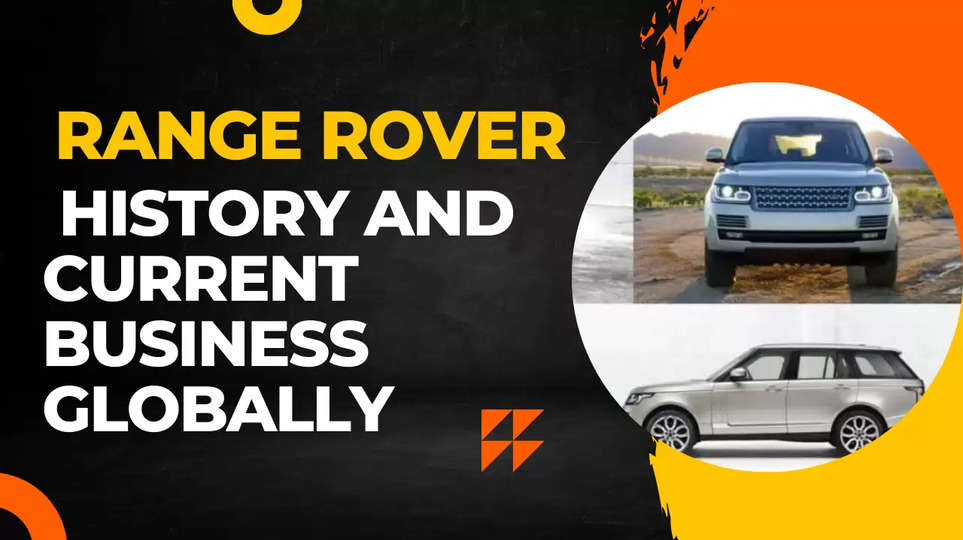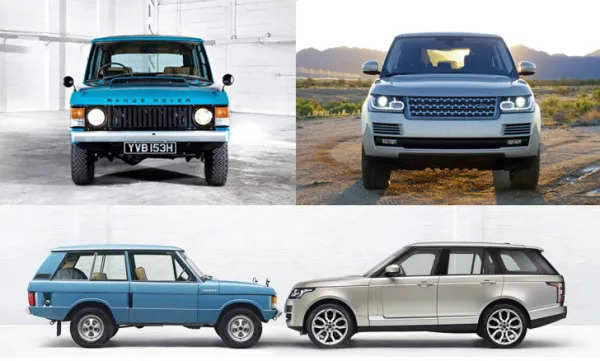Range Rover History and Current Business Globally
Range Rover History and Current Business Globally

Range Rover History and Current Business Globally
Range Rover, a name synonymous with luxury and off-road prowess, has carved out an iconic niche in the global automotive market. From its humble beginnings in the early 1970s to becoming a symbol of status and performance, the Range Rover brand has continuously evolved, adapting to the changing demands of consumers while staying true to its core values. This article delves into the rich history of Range Rover, its impact on the automotive industry, and its current business operations around the world.
The Birth of Range Rover

The Origins of Range Rover
The story of Range Rover began in the late 1960s when the British car manufacturer Rover sought to create a vehicle that combined the off-road capabilities of the Land Rover with the comfort and luxury of a passenger car. This vision led to the development of the Range Rover, a vehicle that would redefine the SUV market.
The Vision Behind Range Rover
The primary goal was to create a versatile vehicle capable of handling rugged terrains without compromising on comfort. Maurice Wilks, one of the key figures behind the Land Rover, played a pivotal role in shaping this vision, which ultimately led to the birth of the Range Rover.
Launch of the First Range Rover in 1970
In 1970, the first Range Rover was introduced to the world. The original model, known as the Range Rover Classic, featured a simple yet robust design, with a V8 engine, a full-time four-wheel-drive system, and a coil-spring suspension. It was an instant hit, praised for its unique blend of off-road capability and on-road comfort.
Initial Market Reception and Early Competitors
The Range Rover's launch marked a significant moment in automotive history. It quickly gained popularity, particularly among those who desired a vehicle that could handle both urban and rural environments. Its early competitors, such as the Jeep Wagoneer, struggled to match its balance of luxury and ruggedness, solidifying Range Rover's position in the market.
Evolution Through the Decades
Range Rover in the 1980s
The 1980s were a transformative decade for Range Rover, as the brand began to innovate and expand its offerings.
Introduction of Advanced Features
During this period, Range Rover introduced several advanced features, including electronic fuel injection, anti-lock brakes, and automatic transmission. These enhancements not only improved performance but also solidified its status as a luxury vehicle.
Growth in Popularity and Expansion
Range Rover's popularity continued to grow throughout the 1980s. The brand expanded into new markets, including North America, where it quickly became a favorite among affluent consumers seeking a luxury SUV.
Range Rover in the 1990s
The 1990s saw Range Rover pushing the boundaries of design and technology, further establishing itself as a leader in the luxury SUV segment.
Design Innovations and Technological Advancements
In the 1990s, Range Rover introduced a more refined design with smoother lines and a more luxurious interior. Technological advancements, such as air suspension and advanced safety features, further enhanced its appeal.
Entry into the North American Market
Range Rover's entry into the North American market was a significant milestone. The brand's ability to cater to the preferences of American consumers, who favored larger, more powerful vehicles, helped it gain a strong foothold in the region.
Range Rover in the 2000s
The new millennium brought a renewed focus on luxury and innovation for Range Rover.
New Models and Expanding the Lineup
In the 2000s, Range Rover expanded its lineup with new models, including the Range Rover Sport and Range Rover Evoque. These models catered to different segments of the market, offering a range of options for consumers.
Focus on Luxury and Off-Road Capability
Despite the expansion, Range Rover maintained its commitment to luxury and off-road capability. The brand continued to refine its vehicles, ensuring that they remained at the forefront of the luxury SUV market.
Range Rover's Global Impact
Range Rover in Europe
Europe has always been a stronghold for Range Rover, where it continues to dominate the luxury SUV market.
Dominance in the Luxury SUV Market
Range Rover's presence in Europe is marked by its dominance in the luxury SUV segment. The brand's ability to blend sophistication with performance has made it a favorite among European consumers.
Impact on European Automotive Trends
Range Rover has had a significant influence on automotive trends in Europe, particularly in the luxury segment. Its success has prompted other manufacturers to enter the luxury SUV market, but few have been able to match its prestige.
Range Rover in North America
In North America, Range Rover's success is a testament to its adaptability and understanding of consumer preferences.
Adapting to American Consumer Preferences
Range Rover's ability to adapt to the unique preferences of American consumers, such as the demand for powerful engines and spacious interiors, has been key to its success in the region.
Contribution to the SUV Boom
The brand has also played a significant role in the SUV boom in North America, with its vehicles often seen as the benchmark for luxury and performance in the segment.
Range Rover in Asia
Asia, particularly China and India, represents a growing market for Range Rover, as the brand continues to expand its global footprint.
Penetration into Emerging Markets
Range Rover's entry into emerging markets like China and India has been marked by strategic efforts to cater to the tastes and preferences of these regions. The brand's appeal in these markets lies in its blend of luxury and status.
Popularity in China and India
In recent years, Range Rover has gained considerable popularity in China and India, where the demand for luxury vehicles is on the rise. The brand's ability to position itself as a status symbol has contributed to its growing success in these markets.
The Modern Era of Range Rover
Range Rover's Current Model Lineup
Today, Range Rover's model lineup is more diverse than ever, offering a range of options to suit different tastes and preferences.
Overview of the Latest Models
The current lineup includes models such as the Range Rover Velar, Range Rover Evoque, Range Rover Sport, and the flagship Range Rover. Each model offers a unique blend of luxury, performance, and technology.
Technological Innovations and Sustainable Practices
Range Rover has embraced technological innovations and sustainable practices, incorporating features such as hybrid powertrains, advanced driver assistance systems, and eco-friendly materials in its vehicles.
Range Rover's Role in the Electric Vehicle Revolution
As the automotive industry shifts towards electrification, Range Rover is positioning itself at the forefront of this revolution.
Development of Electric and Hybrid Models
Range Rover has already introduced hybrid models and is actively developing fully electric vehicles to meet the growing demand for eco-friendly options.
Future Plans and Projections
The brand's future plans include the launch of several electric models, positioning it as a leader in the luxury electric SUV segment. Range Rover's commitment to sustainability and innovation ensures that it will remain relevant in the years to come.
Range Rover's Position in the Global Market Today
In today's global market, Range Rover continues to be a dominant force, with a strong presence in key regions around the world.
Market Share and Sales Figures
Range Rover's market share and sales figures reflect its enduring popularity and success. The brand continues to perform well in established markets while making significant inroads in emerging ones.
Challenges and Opportunities in the Global Market
However, the global market presents both challenges and opportunities. The shift towards electric vehicles, increasing competition, and economic fluctuations are some of the factors that Range Rover must navigate to maintain its leadership position.
Conclusion
Range Rover's journey from its inception in 1970 to its current status as a global luxury brand is a testament to its ability to innovate, adapt, and consistently deliver excellence. As the brand looks to the future, it remains committed to maintaining its reputation for luxury, performance, and off-road capability while embracing the challenges and opportunities of a rapidly changing automotive landscape.
FAQs
What is the origin of the Range Rover brand?
The Range Rover brand originated in the late 1960s when the British car manufacturer Rover sought to create a vehicle that combined the off-road capabilities of the Land Rover with the comfort and luxury of a passenger car.
How has Range Rover evolved over the years?
Range Rover has evolved significantly since its launch in 1970, introducing advanced features, expanding its model lineup, and adapting to changing consumer preferences while maintaining its core values of luxury and performance.
What is the significance of Range Rover in the luxury SUV market?
Range Rover is considered a pioneer in the luxury SUV market, setting the benchmark for other manufacturers. Its blend of luxury, performance, and off-road capability has made it a dominant force in the segment.
How is Range Rover adapting to the electric vehicle trend?
Range Rover is actively developing hybrid and fully electric models as part of its commitment to sustainability and innovation, ensuring it remains competitive in the rapidly evolving automotive industry.
What are the current challenges for Range Rover globally?
Range Rover faces challenges such as increasing competition, the shift towards electric vehicles, and economic fluctuations. However, these also present opportunities for the brand to innovate and expand its global presence.
